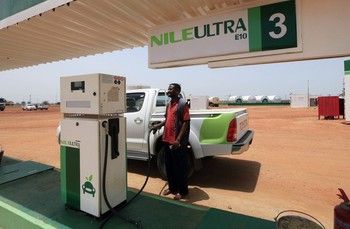Sudan police says unknown assailants behind death during fuel subsidies protests
September 23, 2013 (KHARTOUM) – The Sudanese police issued a press statement late on Monday confirming earlier reports of a death during the demonstrations that broke out in the country’s second largest town of Wad Madani to protest the government’s decision to cut fuel subsidies.

As the police apparently failed to control the situation, army units were reportedly deployed and the local government convened an emergency meeting in which it decided to impose a curfew.
But authorities downplayed the events saying that they were limited and caused by a section of outlaws who exploited homeless people and sent them to the main bust stop in town.
Sudan’s police said in their statement that protestors inflicted damage on a lone gas station but that plots to attack the Gezira state TV and other buildings were thwarted and arrests were made while others were still being chased.
The National Intelligence and Security Services (NISS) in its Facebook page accused leftist forces of spreading rumors about the death of a protestor and stressed that they are fully conscious of the sanctity of Sudanese blood.
It also warned against attacks on public or private properties because they belong to the Sudanese people and affirmed the constitutional right of peaceful demonstrations.
Social media sites have widely circulated what it said was the death of 23-years old Mazin Sid Ahmed during the demonstrations.
Later the Sudanese police said that a civilian car started firing at protestors leading to the death of a 23-years old Ahmed Mohamed Ali who died on spot.
It is not clear if it is the same person referenced by activists.
FORMAL DECISION ON SUBSIDIES
Earlier today the Sudanese cabinet formally endorsed a decision that has been circulated the night before by which prices of gasoline and diesel were increased by almost 100%.
A gallon of gasoline now costs 21 Sudanese pounds ($4.77 based on official exchange rate) compared to 12.5 pounds ($2.84).
Diesel also went from 8 pounds ($1.81) a gallon to 14 pounds ($3.18).
Cooking gas cylinders are now are priced at 25 pounds ($5.68) from 15 pounds ($3.40).
The cabinet also raised the US dollar exchange rate for importing purposes to 5.7 pounds compared to 4.4. The black market rate now stands at 8.2.
Sudan’s finance minister Ali Mahmood Abdel-Rasool said that the adjusted exchange rate will not cover medicine, fuel, wheat, sugar or production inputs.
Abdel-Rasool stressed that the new rate was meant for luxury goods such as new cars, air conditioners, fruits and digital products.
He noted that the government still subsidizes gasoline for 10 pounds per gallon, diesel for 13 pounds and cooking gas for 66 pounds.
The minimum wage increase will be effective on October 1st, he said adding that poor families will see an increase of 150 pounds in their allowances which is expected to cover 5000,000 families.
The Sudanese president Omer Hassan al-Bashir held a two-hour press conference on Sunday night which he devoted primarily to defending the move to cut subsidies and reiterated his earlier arguments that most of these subsidies goes into the pockets of the wealthy population at the expense of the poor ones.
Bashir further asserted that some neighboring countries benefit from the subsidies as a result of smuggling adding that it is hard to control the borders to prevent that due to its length. He further said that some government officers allow the smuggling in return for briberies.
He went on to say that inflation rate has declined from 43% two months ago to 23% currently and that after removing fuel subsidies the economy will stabilize which will help devote resources to agriculture and industry as well as curbing speculative activities in land and currencies.
The issue of subsidies has sparked anger even among some of the ruling party officials forcing the government to go on the defensive about its necessity to prevent an economic collapse.
The finance minister warned that inaction on these reforms means a regression to an economy of scarcity with long bread and fuel queues as it was in the past.
Abdel-Rasool pointed that vehicles belonging to the United Nations and the U.S. charge d’affaires in Khartoum benefit from fuel subsidies adding that the purchases of fuel costs the government 24 billion pounds and 2.5 billion pounds for wheat.
He stressed that these amounts exceed an entire country’s budget and pointed out that the government buys at the market price of $146 dollars per barrel and sells it to refineries $49 which means losing $97 dollars per barrel.
Sudan’s economy took a strong hit when oil-rich South Sudan became an independent state in July 2011 leaving the north suffering from dollar shortages, soaring budget deficit and high inflation.
Prior to the country’s breakup, Sudan produced close to 500,000 barrels but now its output is limited to 140,000 barrels per day. Oil revenue constituted more than half of the Sudan’s revenue and 90% of its exports.
The government in Khartoum is hoping that the fees collected from Juba for exporting its oil should cover part of the budget hole left by the country’s breakup but South Sudan oil production is still below optimal levels as a result of a year-long suspension.
(ST)
